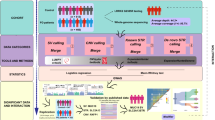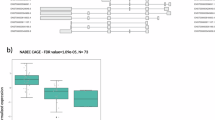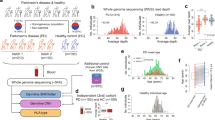Abstract
Primary brain calcification (PBC) is a dominantly inherited calcifying disorder of the brain. SLC20A2 loss-of-function variants account for the majority of families. Only one genomic deletion encompassing SLC20A2 and six other genes has been reported. We performed whole-exome sequencing (WES) in 24 unrelated French patients with PBC, negatively screened for sequence variant in the known genes SLC20A2, PDGFB, PDGFRB and XPR1. We used the CANOES tool to detect copy number variations (CNVs). We detected two deletions of exon 2 of SLC20A2 in two unrelated patients, which segregated with PBC in one family. We then reanalyzed the same series using a QMPSF assay including one amplicon in each exon of SLC20A2 and detected two supplemental partial deletions in two patients: one deletion of exon 4 and one deletion of exons 4 and 5. These deletions were missed by the first screening step of CANOES but could finally be detected after readjustment of bioinformatic parameters and use of a genotyping step of CANOES. This study reports the first partial deletions of SLC20A2 and strengthens its position as the major PBC-causative gene. It is possible to detect short CNVs from WES data, although the sensitivity of such tools should be evaluated in comparison with other methods.
Similar content being viewed by others
Log in or create a free account to read this content
Gain free access to this article, as well as selected content from this journal and more on nature.com
or
References
Nicolas G, Charbonnier C, de Lemos RR et al: Brain calcification process and phenotypes according to age and sex: Lessons from SLC20A2, PDGFB, and PDGFRB mutation carriers. Am J Med Genet B Neuropsychiatr Genet 2015; 168: 586–594.
Wang C, Li Y, Shi L et al: Mutations in SLC20A2 link familial idiopathic basal ganglia calcification with phosphate homeostasis. Nat Genet 2012; 44: 254–256.
Nicolas G, Pottier C, Maltete D et al: Mutation of the PDGFRB gene as a cause of idiopathic basal ganglia calcification. Neurology 2013; 80: 181–187.
Keller A, Westenberger A, Sobrido MJ et al: PDGFB mutations cause brain calcifications in humans and mice. Nat Genet 2013; 45: 1077–1082.
Legati A, Giovannini D, Nicolas G et al: Mutations in XPR1 cause primary familial brain calcification associated with altered phosphate export. Nat Genet 2015; 47: 579–581.
Nicolas G, Rovelet-Lecrux A, Pottier C et al: PDGFB partial deletion: a new, rare mechanism causing brain calcification with leukoencephalopathy. J Mol Neurosci 2014; 53: 171–175.
Baker M, Strongosky AJ, Sanchez-Contreras MY et al: SLC20A2 and THAP1 deletion in familial basal ganglia calcification with dystonia. Neurogenetics 2013; 15: 23–30.
Vanlandewijck M, Lebouvier T, Andaloussi Mae M et al: Functional characterization of germline mutations in PDGFB and PDGFRB in primary familial brain calcification. PLoS One 2015; 10: e0143407.
Nicolas G, Pottier C, Charbonnier C et al: Phenotypic spectrum of probable and genetically-confirmed idiopathic basal ganglia calcification. Brain 2013; 136: 3395–3407.
Li H, Durbin R : Fast and accurate long-read alignment with Burrows-Wheeler transform. Bioinformatics 2010; 26: 589–595.
McKenna A, Hanna M, Banks E et al: The Genome Analysis Toolkit: a MapReduce framework for analyzing next-generation DNA sequencing data. Genome Res 2010; 20: 1297–1303.
Backenroth D, Homsy J, Murillo LR et al: CANOES: detecting rare copy number variants from whole exome sequencing data. Nucleic Acids Res 2014; 42: e97.
Hsu SC, Sears RL, Lemos RR et al: Mutations in SLC20A2 are a major cause of familial idiopathic basal ganglia calcification. Neurogenetics 2013; 14: 11–22.
Bottger P, Pedersen L : Mapping of the minimal inorganic phosphate transporting unit of human PiT2 suggests a structure universal to PiT-related proteins from all kingdoms of life. BMC Biochem 2011; 12: 21.
Acknowledgements
We are grateful to Camille Charbonnier for her help in relatedness estimation, and to patients and physicians involved in medical care and follow-up of patients: Philippe Baize, Nolwen Delarue, Alexandra Durr, Patrick Louf, Yann Nadjar, Gilles Olivier, Stéphane Schaeffer, and Frédéric Sedel. This study was funded by Conseil Régional de Haute Normandie - APERC 2014 no. 2014-19 in the context of Appel d’Offres Jeunes Chercheurs (CHU de Rouen). SD thanks Fondation pour la Recherche Médicale (DEA20140630628) and JF thanks FACEPE (IBPG-0627-2.02/11; AMD-0047-2.00/15) for financial support.
Author information
Authors and Affiliations
Corresponding author
Ethics declarations
Competing interests
The authors declare no conflict of interest.
Additional information
Supplementary Information accompanies this paper on European Journal of Human Genetics website
Supplementary information
Rights and permissions
About this article
Cite this article
David, S., Ferreira, J., Quenez, O. et al. Identification of partial SLC20A2 deletions in primary brain calcification using whole-exome sequencing. Eur J Hum Genet 24, 1630–1634 (2016). https://doi.org/10.1038/ejhg.2016.50
Received:
Revised:
Accepted:
Published:
Issue date:
DOI: https://doi.org/10.1038/ejhg.2016.50
This article is cited by
-
Upstream open reading frame-introducing variants in patients with primary familial brain calcification
European Journal of Human Genetics (2024)
-
PDGF receptor mutations in human diseases
Cellular and Molecular Life Sciences (2021)
-
Primary familial brain calcification caused by a novel homozygous MYORG mutation in a consanguineous Italian family
neurogenetics (2019)
-
Clinical and radiological diversity in genetically confirmed primary familial brain calcification
Scientific Reports (2017)



